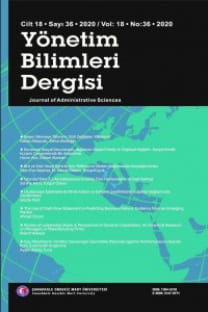Bangladesh's Regulatory Framework for Election Standards: Highlighting and Addressing its Weaknesses
Bangladeş'in Seçim Standartlarının Düzenleyici Çerçevesi: Bangladeş'teki Zayıflıklıkları
___
- Akhter, Muhammad Yeahia, 'Electoral Corruption in Bangladesh', Ashgate Publish- ing Company, UK., 2001.
- Aliyu, Nasiru Adamu, 'Concept of Democratic Elections under International Law', Re- search Journal of International Studies, April, 2009, Issue No. 10.
- Grofman, Bernard and Lijphart, Arend, 'Electoral Laws and their Political Conse- quences', Agathon Press, Inc. New York, 1994.
- Cox, Gary W. 'Making Votes Count: Strategies Coordination in the Worlds Electoral Sys- tem', Political Economy of Institutions and Decisions, Cambridge University Press, 2002.
- Global Commission Report, 'Global Commission on Elections, Democracy and Secu- rity', 2012, The Global Commission on Elections, Democracy and Security, jointly established in 2010 by International IDEA and the Kofi Annan Founda- tion, aims to promote and protect the integrity of the electoral process, which is fundamental to achieving a more secure, prosperous and stable world. Available at-http://www.idea.int/news/deepening-democracy-a-strategy-for- improving-the-integrity-of-elections-worldwide.cfm (Last accessed on 16 Sep- tember, 2012).
- Harrop, Martin and Miller, William L., 'Elections and Voters: A Comparative Introduc- tion' The Macmillan Press Limited, Printed in Hong Kong, 1987.
- IFES, 'Making Democracy Work: Pre-Election Technical Assessment: Republic of Bangla- desh', International Foundation for Electoral Systems, September, 2000.
- Innovations for Successful Societies, An Interview given by Peter Eicher, Inter- viewer: Varanya Chaubey, Elections, Interview no.: J1, Date of Interview: 2 February, 2009, An initiative of the National Academy of Public Administration, and the Woodrow Wilson School of Public and International Affairs and the Bobst Center for Peace and Justice, Princeton University.
- International Institute for Democracy and Electoral Assistance, 'International Elec- toral Standards: Guidelines for Reviewing the Legal Framework of Elections', IDEA., 2002.
- The International Institute for Democracy and Electoral Assistance (December, 2011). "Introducing Electronic Voting: Essential Considerations" Policy Paper, IDEA.
- The International IDEA Handbook, 'Voting from Abroad', International Institute for Democracy and Electoral Assistance and the Federal Electoral Institute of Mex- ico, 2007, Available at- http://www.idea.int/publications/voting_from_abroad/ upload/chap0-intro.pdf (Last accessed on 1 January, 2012).
- JANIPOP, 'Ninth Parliamentary Election of Bangladesh', Dhaka, 29 December, 2008, Part: 1, Ninth Parliamentary Election of Bangladesh 2008, Observation Report by JANIPOP, December 7, 2008-January 10, 2009.
- Prasad, Hari K, J. Alex Halderman, Rop Gonggrijp, Scott Wolchok, Eric Wustrow, Arun Kankipati, Sai Krishna Sakhamuri, Vasa Yagati, 'Security Analysis of In- dia's Electronic Voting Machines', University of Michigan, USA., 2010, Available at- http://indiaevm.org/evm_tr2010.pdf (Last accessed on 12 February, 2012).
- Rahman, Taiabur, 'Problems of Democratic Consolidation in Bangladesh: A Cultural Ex- planation', NAPSIPAG Conference 2006, University of Sydney, Australia.
- Silverman, David, 'Interpreting Qualitative Data: Methods for Analyzing Talk, Text and Interaction', Second Edition, London, Thousand Oaks, New Delhi: Sage Publi- cations, 2006.
- Sobhan, Farooq, 'The European Union as a Partner in Promoting Democracy in Bangla- desh', International Institute for Democracy and Electoral Assistance, Interna- tional IDEA SE-103 34 Stockholm, Sweden, 2009.
- Tawanda, Mutasah, 'Beyond Southern Africa: Electoral Politics and the New Pan-Af- ricanism', Media Institute of Southern Africa, Outside the Ballot Box: Precon- ditions for Elections in Southern Africa, EDIA, 2005/2006, 51, 51-52 (Jeanette Minnie, ed., 2006), Available at- http://www.comminit.com/en/node/278921 (Last accessed on 26 May, 2012).
- T. E. Smith, O. B. E., 'Elections in Developing Countries: A Study of Electoral Procedures Used in Tropical Africa, South-East Asia and the British Caribbean', London, Mac- millan and CO. Ltd. New York, ST Martin's Press, 1960.
- The Reporters Guide, 'Handbook on Election Reporting', 1995, Published by the So- ciety for Environment and Human Development (SHED), 44/8 North Dhan- mondi, West Panthapath, Dhaka-1205, Bangladesh.
- UNDP, 'Understanding Electoral Violence in Asia', Asia-Pacific Regional Centre, Global Programme for the Electoral Cycle Support (GPECS), United Nations Development Programme, 2011.
- ISSN: 1304-5318
- Yayın Aralığı: 4
- Başlangıç: 2003
- Yayıncı: Yönetim Bilimleri Dergisi
Asian 'Developmental' States: Lessons for Africa
Oscar Edoror UBHENİN, Joseph Nwokpoku EDEH
Bangladesh's Regulatory Framework for Election Standards: Highlighting and Addressing its Weaknesses
Accountability and the Changing Function of the Control
Denetim Açısından Bulgaristan, Yunanistan ve Türkiye Yerel Yönetimlerinin Karşılaştırılması
Asian ‘Developmental’ States: Lessons for Africa
Devlet Üniversitelerinde Stratejik Planlama ve Örgütsel Öğrenme İlişkisi Üzerine Bir Araştırma
Understanding Policy Process: Is There A Single Best Way?
Elektronik Alışverişte Akademisyenlerin Güvenlik ve Risk Algılarının Belirlenmesi
